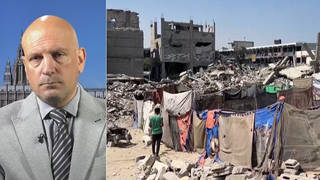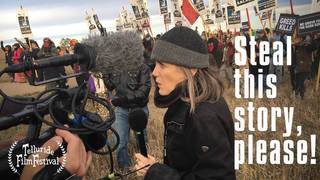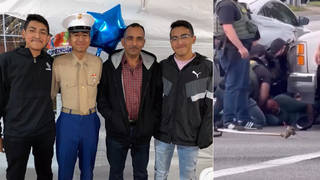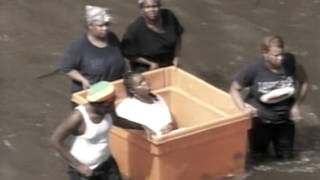
The FBI has arrested the head of an armed vigilante group that has repeatedly filmed itself detaining migrant border crossers at gunpoint. Sixty-nine-year-old Larry Mitchell Hopkins is the leader of the far-right, pro-Trump group calling itself United Constitutional Patriots, which the American Civil Liberties Union described as an “armed fascist militia organization.” His arrest came just days after the ACLU accused the vigilantes of illegally detaining 300 migrants, including young children, near Sunland Park, New Mexico, last week. We speak to Peter Simonson, executive director of the ACLU of New Mexico.
Transcript
JUAN GONZÁLEZ: We begin today’s show in New Mexico, where the FBI has arrested the head of an armed vigilante group that has repeatedly filmed itself detaining migrant border crossers at gunpoint. Sixty-nine-year-old Larry Mitchell Hopkins is the leader of the far-right, pro-Trump group calling itself United Constitutional Patriots, which the American Civil Liberties Union described as an “armed fascist militia organization.” His arrest came just days after the ACLU accused the vigilantes of illegally detaining 300 migrants, including young children, near Sunland Park, New Mexico, last week. Videos posted on social media showed the vigilantes holding migrants at gunpoint. In one of the videos uploaded by the United Constitutional Patriots, a man is heard considering another means of dealing with the migrants.
VIGILANTE: The only problem is, if we shoot on the hill, it’ll be an international crisis. We’re too close to the border. Would save some time, though, wouldn’t it?
AMY GOODMAN: The videos also show militia members praising President Trump’s border policies and echoing Trump’s rhetoric about a so-called invasion of migrants. New Mexico Attorney General Hector Balderas praised the FBI for arresting Larry Mitchell Hopkins, the head of the vigilante group. Balderas said, quote, “This is a dangerous felon who should not have weapons around children and families. Today’s arrest by the FBI indicates clearly that the rule of law should be in the hands of trained law enforcement officials, not vigilantes,” unquote.
According to documents unsealed in court Monday, Hopkins was first brought to the attention of federal authorities in 2017, when the FBI received reports his group was training to assassinate Barack Obama, Hillary Clinton and George Soros. His arrest Saturday on firearms charges comes 12 years after he was arrested in Oregon for unlawfully impersonating a police officer, and more than two decades after he was convicted for illegal possession of a loaded firearm in the state of Michigan in 1996.
Joining us now is Peter Simonson, executive director of the ACLU of New Mexico. He’s in Albuquerque.
Welcome to Democracy Now!, Peter. Can you lay out who this man is, who the FBI have just detained, and what his group was doing along the border?
PETER SIMONSON: Sure. Well, you’ve pretty much explained what we know about Mr. Hopkins to this point. You know, the group has been operating for a while now. I think since we found out about them late last fall, they had been convening down in the Sunland Park area. And we really did not expect to see any sort of activity of the kind that they have manifested over the last several weeks, where they are actually detaining people, dozens of families, at gunpoint, and, you know, threatening them. These are families that consist of young mothers, younger children, even infants. And, you know, if you watch the videos, they’re just chilling. They’re just heartrending, to see innocent people exposed to this kind of a menace.
JUAN GONZÁLEZ: Now, Peter Simonson, there’s quite a long history, isn’t there, of vigilante groups along the border? I think back to the 1990s, when there was a whole Light Up the Border movement by people who were concerned then that there was a major crisis of migrants coming across the border, and there have been isolated instances. But now we’re talking about—it seems to be a more permanently organized group. Don’t they actually have a small area that they’re camping out in near the border?
PETER SIMONSON: Yes, that’s true. The surge that we saw in the early 2000s, in the name of the Minutemen, really was kind of a temporary movement, it seemed, and they never demonstrated the kinds of behaviors that we’re seeing right now. This group seems to have a permanent encampment there, as of until Friday, this coming Friday. The El Paso Times, in fact, yesterday reported that the Union Pacific Railroad and the Sunland Park police have required them to move off the premises. And they are putting up, as I understand it from the story, “no trespassing” signs in that area. So it’s not entirely clear what the future fate of the vigilante group will actually be. But your point is exactly right. This is a more—appears to be a more determined group, and certainly a group that feels more empowered to take law into their own hands, and doesn’t seem to understand any of the consequences of their actions.
AMY GOODMAN: I’d like to turn to Jim Benvie, the spokesperson for the United Constitutional Patriots, who spoke to the El Paso Times.
JIM BENVIE: People ask me also: What is the rule of engagement here? The rule of engagement is, is that we are here just like anybody else, and the only time that we’re going to open fire is if we feel imminent threat or danger to our lives. We are a group of basically volunteer Americans who have come down here. We’re retired vets, retired law enforcement, special forces. We’ve come down here not as a militia, but as a group of Americans to help protect the border crisis that’s going on down here. This is a national security issue. Obviously, Border Patrol is part of this, as well. We’re trying to assist them. As far as in the overload, there’s areas right now that the Border Patrol can’t cover, because we have too many people coming through the border claiming false asylum.
AMY GOODMAN: In one of the videos narrated by Jim Benvie, posted online, vigilantes armed with assault rifles are seen approaching a group of several dozen people seated on the ground.
JIM BENVIE: Hey, guys. This is Jim with the United Constitutional Patriots and We Build the Wall. … As you can see, we did actually end up getting everybody wound up. It was a combination of us and some good horses over there and basically a team effort here.
AMY GOODMAN: So, Peter Simonson, if you can describe the scene? Some of these people, were they actually handcuffed? And talk about the distinction you make between a militia and vigilante.
PETER SIMONSON: Sure. I haven’t seen that particular segment of the video, so I’m not privy to the particular details. There’s 12 hours of video that they’ve posted on their Facebook site, and it’s been hard to comb through all of it. We’ve actually been very appreciative of the media, like Democracy Now!, that has done some of that work for us.
You know, we think that these folks should be labeled “vigilantes” because they are taking the law into their own hands. They meet every definition of “vigilante.” They believe that they understand what the terms of justice should be better than what the law actually outlines for us, and are willing to actually go to the lengths of using heavy weaponry to enforce the law as they see it should be done. I think they only adopt the name “militia” for the purpose of trying to associate themselves with some sort of constitutional narrative that they think justifies their actions, when in fact they are just a lawless band of individuals who are misguided in their intentions.
JUAN GONZÁLEZ: And do you have any sense of what the Border Patrol relationship is to these groups? Does the Border Patrol discourage citizens from taking action, or does it welcome the support of some kind by locals?
PETER SIMONSON: Great question. I think this is one of the outstanding questions that we have right now. There’s plenty of video evidence—I think you just showed some—that suggests that the Border Patrol is actively collaborating with these folks, despite the fact that they’ve made a public statement saying that they neither condone nor endorse their activity. We have plenty of video documentation showing Border Patrol showing up to take the folks that they have illegally detained into custody. There are pictures of the Constitutional Patriot folks posing in photos with Border Patrol on horseback. There seems to have been a fairly easy and cooperative relationship between the vigilante group and the Border Patrol.
And, you know, the question I am left with is: Why did no one tell these folks to cease and desist? And if the Border Patrol is in fact a law enforcement agency, even if they themselves were not going to initiate an investigation into these folks, why couldn’t they have called upon FBI to look into the matter? We met with the U.S. attorney here in New Mexico late last night—late yesterday afternoon and asked him what has been done to tell these folks to stop what they’re doing. And, you know, he could only share so much, but it’s my understanding, from—I have been given no evidence to say that any federal authority has told these folks they need to stop what they’re doing.
And so, you know, our key concern is that families’ safety, families’ welfare is at stake here. You look at those videos, and what you see is literally dozens of families huddled in the sand in a remote part of the desert in the dead of night, surrounded by men in military camouflage, masked many times, with heavy weaponry, semiautomatic weapons in some instances. You can only imagine a situation where somebody reaches for something in their pocket, pulls out a cellphone, and it looks like a firearm. And you have a gunfight that ensues. Those kinds of tragedies are the ones we have been really trying to move to avoid.
AMY GOODMAN: Speaking to BuzzFeed News, one of the vigilantes, Mark Cheney, acknowledged some members of the—wore badges similar to those worn by Border Patrol agents. He said, “If [immigrants] can’t tell the difference, that’s their problem.” Now, isn’t that Cheney’s problem? I mean, you have the guy that the FBI just arrested, 12 years ago being arrested in Oregon for unlawfully impersonating a police officer. Isn’t it illegal to do that? And why is it just the head of this vigilante group that has been taken in? And if Trump is supporting them, what will happen next?
PETER SIMONSON: Amy, you’re asking all the questions that are foremost in our mind right now. From all appearances, these folks were impersonating federal officers, even approaching immigrant families and announcing themselves as U.S. Border Patrol, in other cases announcing themselves as polícia to the Spanish-speaking immigrants. I don’t understand how, under any definition that you see in federal law, they can’t be charged—and by “they,” I mean not just Mr. Hopkins, but the rest of the folks there that are gathered on the border—with falsely impersonating a federal officer.
And that’s just the beginning of possible federal charges against these folks. We’re also looking at possible kidnapping, conspiracy to kidnap. The fact that they have—that they’re armed and holding people at gunpoint only adds to the seriousness of those federal crimes. And so, really, we are hoping to see that our federal authorities are going to bring further charges against these people, because the video evidence—and there’s a wealth of it—shows that they should be—they appear to be guilty of multiple crimes. And Mr. Hopkins is just the tip of the iceberg.
AMY GOODMAN: And, of course, we only know about this because they made a video. They themselves posted it online. How much is this happening along the border? And let’s not forget that your state, New Mexico, is where the two children in Border Patrol custody died, the migrant children.
PETER SIMONSON: Yeah, exactly. And beyond that, obviously these folks lack some degree of competence, that they were so bold as to actually broadcast, advertise, videotape their illegal activity. But you have to think at some point some caution must have clicked in, and where their more extreme actions were happening, maybe they didn’t videotape. So, I don’t think we know the full story of how these people were actually treating the families that they were illegally taking into custody. And who’s to say whether somebody might be out in the desert still, having been the victim of a gunshot, or someone that was roughed up and escaped through another part of the border? I mean, we have no idea what these people are doing to the families that are coming across. And unless this activity is stopped, again, it could end very tragically.
AMY GOODMAN: But we do know that people like No More Deaths, who put bottles of water in the desert so that people won’t die of thirst, are being arrested. Peter Simonson, I want to thank you for being with us, executive director of the ACLU of New Mexico.
This is Democracy Now! When we come back, we’re going to cover two campus protests—a sit-in at Johns Hopkins in Baltimore and a protest at the University of Arizona—around immigration presence on campus. Stay with us.
[break]
AMY GOODMAN: Activists singing a song by Colleen Kattau in Nogales, Mexico, at the U.S. border. You can go to democracynow.org to see the images of a 16-year-old Mexican boy, José Antonio, who was shot and killed in that spot by the border wall by a Border Patrol agent.












Media Options